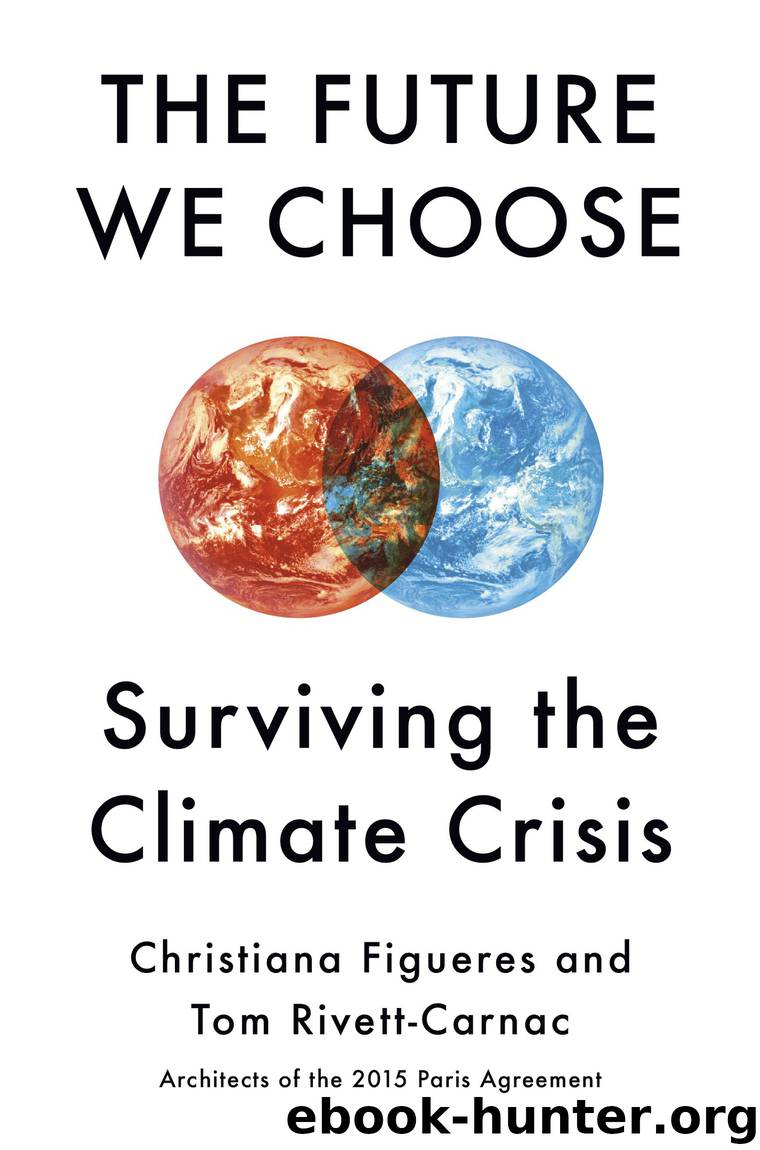The Future We Choose by Christiana Figueres & Tom Rivett-Carnac

Author:Christiana Figueres & Tom Rivett-Carnac
Language: eng
Format: epub
Publisher: Knopf Doubleday Publishing Group
Published: 2020-02-24T16:00:00+00:00
* * *
—
Learn to distinguish between real science and pseudoscience. In 2017, the Heartland Institute, a conservative think tank funded in part by the Mercer Family Foundation, sent beautifully produced textbooks on climate science to three hundred thousand schoolteachers across the United States. The book, originally targeting policy makers and published in 2015 to coincide with the Paris negotiations, was titled Why Scientists Disagree About Global Warming and began with this statement: “Probably the most widely repeated claim in the debate over global warming is that ‘97% of scientists agree’ that climate change is man-made and dangerous. This claim is not only false, but its presence in the debate is an insult to science.” This textbook, authored by “distinguished climate scientists,” was sent to teachers, with a letter urging them to use the book and its accompanying DVD in their classrooms. The Heartland Institute, which promotes denial of established climate science, encouraged people to “seek out advice from independent, non governmental organizations and scientists who are free of financial and political conflicts of interest” rather than relying on the UN Intergovernmental Panel on Climate Change (IPCC) for scientific advice.
It would have been extremely difficult for some recipients of that book to determine whether this was real science or bunk, and whether the authors were indeed distinguished climate scientists. In fact, one author was formerly director of environmental science at Peabody Energy (a coal company that went bankrupt). That author has a master’s degree and a Ph.D. in geography, not climate science. One of his credits is that he is the lead author of the reports of the Nongovernmental International Panel on Climate Change (NIPCC). Note the striking and confusing similarity of that name to the UN-backed IPCC. The NIPCC is actually a project sponsored by the Heartland Institute. Many teachers immediately saw the textbook as the unscientific propaganda it was, but those who didn’t and used it in their classrooms had a lasting impact on their students.
This story teaches us a good lesson: even when a document looks “official,” is beautifully produced, and is authored by real scientists, we should approach its contents with caution. It is essential that you make the extra effort to determine whether you are basing your opinions on fact or fiction. Check where your information comes from. If necessary, follow the money. Determine the source of the funding for the research in question, be it a climate science statement, report, or article. See if the research is accredited by an established university or other well-known academic body. The simplest way to do this is to find out if the study was “peer reviewed,” meaning reviewed and evaluated by other experts in the field. For example, the IPCC report on 1.5 degrees Celsius, released in October 2018, was a collaboration of ninety-one authors and review editors from forty different countries. Most mainstream newspapers will have an editorial policy to ensure that sources are either peer reviewed or have similar criteria for reliability, but it is always worth checking.
Download
This site does not store any files on its server. We only index and link to content provided by other sites. Please contact the content providers to delete copyright contents if any and email us, we'll remove relevant links or contents immediately.
The Secret History by Donna Tartt(16607)
The Social Justice Warrior Handbook by Lisa De Pasquale(11485)
Thirteen Reasons Why by Jay Asher(7781)
This Is How You Lose Her by Junot Diaz(5753)
Weapons of Math Destruction by Cathy O'Neil(5029)
Zero to One by Peter Thiel(4816)
The Myth of the Strong Leader by Archie Brown(4785)
Promise Me, Dad by Joe Biden(4440)
Stone's Rules by Roger Stone(4412)
Beartown by Fredrik Backman(4403)
How Democracies Die by Steven Levitsky & Daniel Ziblatt(4392)
The Fire Next Time by James Baldwin(4336)
100 Deadly Skills by Clint Emerson(4070)
A Higher Loyalty: Truth, Lies, and Leadership by James Comey(4024)
Rise and Kill First by Ronen Bergman(4008)
The David Icke Guide to the Global Conspiracy (and how to end it) by David Icke(3875)
The Farm by Tom Rob Smith(3869)
Secrecy World by Jake Bernstein(3773)
The Doomsday Machine by Daniel Ellsberg(3725)
